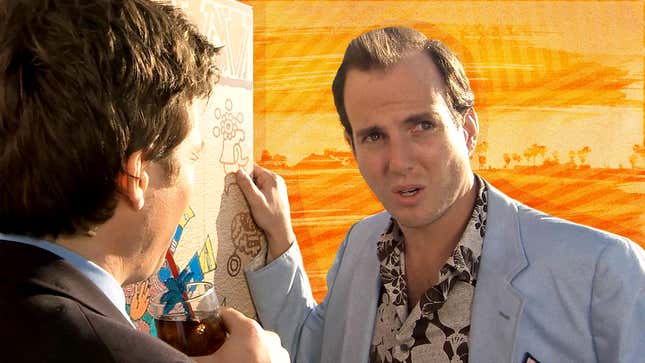
November 2 marks 20 years since we first met a wealthy family who lost everything and the one son who had no choice but to keep them all together. Arrested Development, once a short-lived series treated like high art and a political position, may have had its legacy dinged by a decade dead-set on revivals, but the show’s initial three seasons remain some of the best TV comedy ever. Revisiting the pilot episode, one can see how intricate and confident Arrested Development was from the beginning.
While other shows might have a promising pilot followed by several experimental episodes trying to find what works, Arrested Development knew what it was from the start. And it’s not a Bluth Company model home: This thing had a strong foundation. Creator Mitch Hurwitz didn’t waste any time, either. Nearly everything great about the show can be found in its opening two-and-half minutes.
Speed has always been an important characteristic of Arrested Development, and the pilot, directed by Avengers: Endgame duo Joe and Anthony Russo, announces itself like a starter pistol. Horns blare on the soundtrack as the camera descends on a sun-drenched Orange County. In tandem with the camera and Lee Haxall’s editing, the narrator (Ron Howard) lays out the main characters in simple, objective descriptions that the characters later contradict. Together, they construct a daisy chain, with one introduction leading to another while also laying setups for future punchlines.
We first meet Michael Bluth (Jason Bateman) who, aboard a ship for his father’s retirement party, expects to be named his father’s successor, and right now, “he is happy.” “This is Michael’s Mother,” the narrator says as Lucille Bluth (Jessica Walter) confronts her son about what the “homosexuals have done to me.” She’s referring to a boat of gay protestors that she worries will upstage her husband’s party. (Maybe not everything on the show has aged well.)
As she complains without a hint of self-awareness, Michael’s twin sister, Lindsay (Portia de Rossi), jumps into the frame to chastise her mother’s homophobia before noticing one of the protestors wearing her blouse. Without revealing he’s on the activist tugboat, the narrator then introduces her husband, Tobias (David Cross), “(not on boat),” a profoundly closeted analyst/therapist. The show uses Tobias as a means of introducing the show’s cross-cutting flashback structure to the audience. A short series of scenes from Lindsay’s life in Boston ends with a photo of the Bluth siblings, allowing the narrator to present Gob (Will Arnett), the eldest Bluth child, a part-time magician, and the founder of the Alliance of Magicians, and a set-up for the youngest and most anxious Bluth, Buster (Tony Hale). The show returns to the present to introduce him as the most developmentally arrested Bluth child. Finally, with all siblings accounted for, the narrator reveals that Michael will be leaving his family behind.
All this happens in less than two and a half minutes. The clear and concise presentation, thanks in no small part to the narration and its unbeatable cast of past, present, and future comedy A-listers, establishes the show’s tone, style, and mechanics quickly while keeping the jokes flying and characterization consistent. Part of the rapid editing is possible because the show’s jokes are a vital storytelling tool that humors the audience and teaches us who these people are. Gob’s self-seriousness toward his magic is undercut by the fact that he’s not interested in his audience. “Illusion, Michael,” Gob corrects Michael, who refers to GOB’s latest prop, the Aztec Tomb, as a “magic trick.” A trick, as Gob puts it, is something “a whore does for money.” After noticing a group of children watching on with shocked expressions, he improvises, “Or candy.” The extended pilot goes further: “Or cocaine.”
These jokes don’t only signal characterization; they further plot as well. The boat of protestors harbors Tobias, whose experience at sea inspires a career change. He’ll become an actor. But also, that it is, in fact, Lindsay’s blouse. Hurwitz continues stacking pieces on top of the characters through Arrested Development’s glut of information. These moments of delusion do as much to tell us who these characters are, providing a baseline for the rest of the series.
With the structure understood, the rest of the pilot continues in this fashion, introducing the rest of the cast, including Michael’s father, George Sr. (Jeffrey Tambor), Michael’s son, George Michael (Michael Cera, as if we haven’t written the name “Michael” enough), and Lindsay’s daughter, Maeby (Alia Shawkat). The latter exemplifies Hurwitz’s playfulness, too, as her name becomes a running mystery on the show. Is she George Michael’s cousin? Maybe, but that won’t pay off until the last episode of the original run, that initial series finale that drives home the success of the pilot. For the 2006 conclusion, the show returns to the ship for another Michael Bluth coronation and another escape attempt. The finale bookends the show on a character high for Michael, firmed up by the very characterizations we saw in those first two minutes. In it, he’s happy because he’s giving them a chance to keep themselves together for a little while.
Arrested Development will always be a more complicated discussion because of the revivals. Though they epitomized the ballooning unwieldiness of the show, they seem wholly separate from the closed loop of the original series. For all the ups and downs of the revivals, when we return to those first two and a half minutes, we see the show’s initial magic trick—sorry, illusion. And unlike George Sr., we’ll always have time for that.